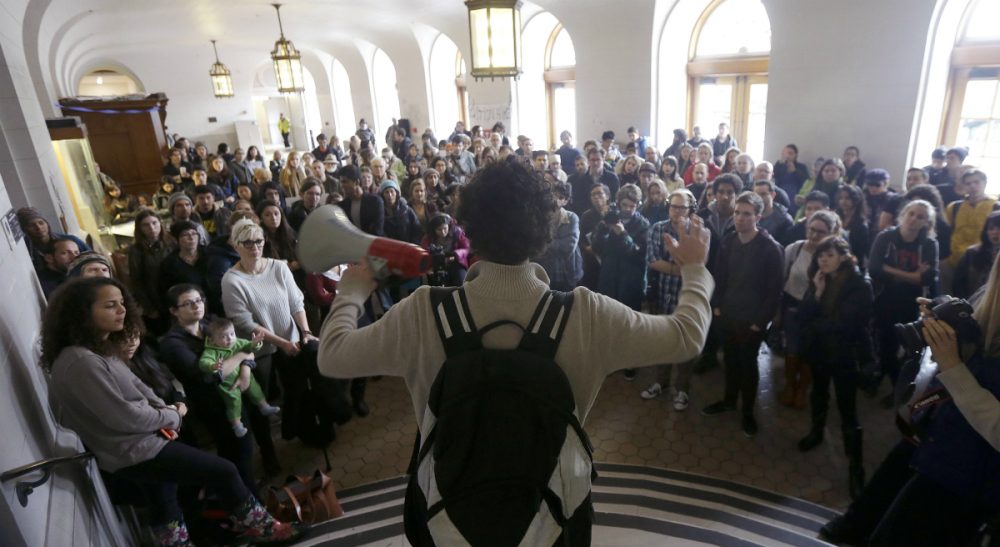Advertisement
Tuition-Free College Is Not A Radical Idea. Here's Why

Bernie Sanders’s pitch of free tuition at public universities has wowed young voters, but otherwise it’s the Rodney Dangerfield of Election 2016: It can’t get respect. Hillary Clinton disses the notion (“I’m not in favor of making college free for Donald Trump’s kids.”), arguing instead for targeted measures to eliminate student debt. The president of Vassar, who’s also an economist, warned that free tuition actually might hurt the needy.
They’re wrong. Free public university tuition would combat inequality, boosting job prospects and lifetime earnings for the have-nots, if we did it right.
I’ve never grasped the argument that the idea is radical, self-proclaimed revolutionary Sanders’s advocacy notwithstanding. It would build on a 150-year-old institution, America’s public universities, created by Abraham Lincoln precisely to expand higher education to “the sons of toil.” Some of these schools were free early in their existence. Today, several advanced nations embrace the policy; Australia implemented a system in which students pay back tuition once they’re graduated and working. The country raised college attendance eight-fold without drowning students in debt or taxpayers in runaway costs.
Free public university tuition would combat inequality, boosting job prospects and lifetime earnings for the have-nots, if we did it right.
There’s another, conservative argument for free tuition: It could be financed by redirecting existing spending. All that the federal government currently spends on higher education — from Pell grants for the poor to work-study money to education-related tax breaks — would cover essentially the full tab, The Atlantic reported.
“If we were scrapping our current system and starting from scratch, Washington could make public college tuition free with the money it sets aside in its scattershot attempts to make college affordable today,” the author says. He adds he’s not sure that we should do that, then offers sound reasons why we should, including the current system’s squandering tax dollars on exorbitant private universities that churn out debt-burdened students. Recall, too, that for all the spending on Pell grants, only one third of the poorest, high-achieving high school seniors attends the country’s 200-plus most selective colleges. If the goal is opening higher ed to those locked out, free public tuition would give the taxpayer more bang for her buck.
The author raises a more substantial objection: Upending the current system would be politically Sisyphean. But if lawmakers balked at redirecting all higher education spending, there are ample alternative sources to tap, starting with tax-code giveaways, particularly to the wealthy. To congressional conservatives, spackling such loopholes could be pitched as part of a broader simplification of the tax code (a fine idea in its own right).
The foregoing case makes hash of most objections to free tuition. Vassar President Catharine Hill objects that absent more funding from states, free public tuition “means fewer resources to teach students,” forcing possible cuts in critical, needs-based financial aid. Yet research suggests that swelling financial aid is self-defeating; it’s a big reason colleges raise tuition in the first place. (Not to mention that colleges have made applying for financial aid a labyrinthine obstacle course.) The paucity of class diversity on all those selective campuses shows that, whatever the obstacles to university access, financial aid isn’t doing enough to demolish them.
Clinton’s case is more compelling; Why should taxpayers foot the bill for rich families’ like Trump’s? But a payback scheme like Australia’s, where graduates repay college costs based on their post-grad income levels, would address that concern. (Journalist Matthew Yglesias also notes that we don’t charge wealthy people extra tuition to attend public high school; we make it free for all and then hit up the wealthy for it through the higher taxes they pay.)
Some conservatives argue that free tuition in other countries has had mixed results. Sure: implementation is always important. Sanders, so often lazy about the details of his proposals, designed his plan poorly. The senator commendably tried to contain the cost to Uncle Sam by splitting it with the states; he’d match every dollar they spend on free tuition with $2 from Washington. Unfortunately, given that half the states turned down a more generous, 9-to-1 match for expanding Medicaid under Obamacare, Sanders’s approach is a surefire nonstarter, Yglesias says.
There’s no magic bullet fixing every flaw in higher education. But relieving families of tuition up front would be a huge helping hand...
Tuition-less college wouldn’t be cheap; families would still foot the bill for room and board. And it addresses access, not quality; that’s another problem requiring other measures. (Australia has been grappling with high dropout rates, among other problems.) There’s no magic bullet fixing every flaw in higher education. But relieving families of tuition up front would be a huge helping hand, and it’s perfectly doable economically.
The problem as always, Yglesias reminds us, is the politics. The Bernie Bros cheering themselves hoarse when their man yells “free tuition!” need to muscle governors and state legislatures, who now control state universities and colleges’ tuition policies, into backing the idea. Meanwhile, meritorious alternatives, such as Clinton’s plan, are our only hope. I can’t find much of anything from Donald Trump on college access. As Clinton says, he doesn’t lose sleep over tuition bills.
